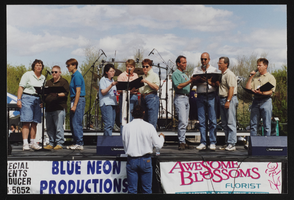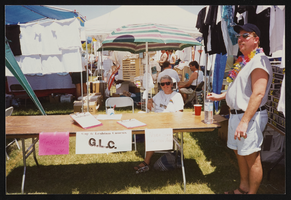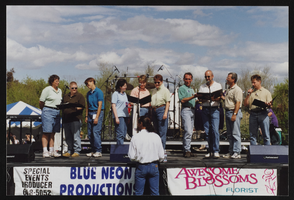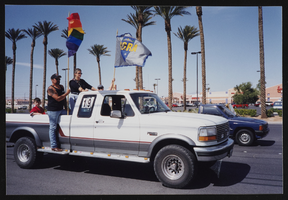Search the Special Collections and Archives Portal
Search Results

Las Vegas Gay and Lesbian Chorus performing at Gay Pride, image 003: photographic print
Date
Archival Collection
Description
Image

Gay and Lesbian Caucus of the Clark County Teachers' Association booth at Gay Pride: photographic print
Date
Archival Collection
Description
Image
Jerry Cade oral history interviews
Identifier
Abstract
Oral history interviews with Jerry Cade conducted by Dennis McBride on various dates in February, May, June, July, and November of 2003 for the Las Vegas Gay Archives Oral History Project. In these interviews, Cade recalls his early life in Kermit, Texas, his education, his Methodist upbringing, and understanding his sexuality during high school and college. He then talks about traveling to Spain in January 1976 where he met his first romantic partner. Cade then describes moving to Las Vegas, Nevada in 1981 to work at the Community Health Centers of Southern Nevada. He also discusses other relationships he had since moving to Las Vegas, his political activism, working on the first American Medical Association panel to study AIDS in 1983, and his first AIDS patient in August 29, 1985. Cade then elaborates on the history of AIDS in Las Vegas, AIDS support and advocacy groups in Las Vegas, the public perception of AIDS and the gay community, and the repeal of Nevada's sodomy law.
Archival Collection

Las Vegas Gay and Lesbian Chorus performing at Gay Pride, image 001: photographic print
Date
Archival Collection
Description
Image
Rodney Sumpter oral history interview
Identifier
Abstract
Oral history interview with Rodney Sumpter conducted by Dennis McBride on August 30, 1999 for the Las Vegas Gay, Lesbian, Bisexual and Transgender Archives Oral History Project. In this interview, Sumpter discusses his involvement with repealing one of Nevada’s sodomy laws (NRS 201.190) in 1985. He recalls going to the Nevada State Supreme Court and discusses similar cases involving sodomy laws in the United States.
Archival Collection
Jay and Jayson Dicotignano oral history interview
Identifier
Abstract
Oral history interview with Jay and Jayson Dicotignano conducted by Dennis McBride on November 05, 2006 for the Las Vegas Gay, Lesbian, Bisexual and Transgender Archives Oral History Project. In this interview, the Dicotignanos talk about their marriage and the Men’s Movement of the late 1980s. Jay discusses his career as a therapist, in public health, and the process to have a gay marriage ceremony at a church. Later, the two describe gay parenthood and what gay couples did to have children. Lastly, they recall foster parent training and becoming foster parents.
Archival Collection
Albert (Bert) Hood oral history interview
Identifier
Abstract
Oral history interview with Albert Hood conducted by Dennis McBride on June 16, 1998 for the Las Vegas Gay Archives Oral History Project. In this interview Bert Hood discusses his early life, getting married to a woman, joining the army, discovering his sexuality, and the various loves of his life. He also talks about coming to Las Vegas, Nevada in 1962, working at the Sands Hotel as a bartender, serving The Rat Pack, who tipped him generously, cruising at Squires Park, local gay landmarks, and the first drag shows in Las Vegas.
Archival Collection

Nevada Gay Rodeo Association float in the third annual Gay Pride parade: photographic print
Date
Archival Collection
Description
Image
Rodney Sumpter oral history interview
Identifier
Abstract
Oral history interview with Rodney Sumpter conducted by Dennis McBride on January 20, 2004 for the Las Vegas Gay, Lesbian, Bisexual and Transgender Archives Oral History Project. In this interview, Sumpter discusses Fred Schoonmaker, a Reno, Nevada gay activist, and his efforts to create Stonewall Park, a town for LGBTQ members in Nevada that was never realized. Sumpter describes his professional relationship with Schoonmaker as his attorney. He also recalls the early stages for Stonewall Park, including finding a location and struggling to find financial and local support for the town. Lastly, Sumpter talks about Schoonmaker's HIV health issues and his personal thoughts on the LGBTQ community.
Archival Collection
Sally MacEachern oral history interviews
Identifier
Abstract
Oral history interviews with Sally MacEachern conducted by Dennis McBride on February 24 and March 11, 2002 for the Las Vegas Gay, Lesbian, Bisexual and Transgender Archives Oral History Project. MacEachern opens her interview discussing her birth and upbringing with her twin sister in Wisconsin during the 1940s. She then describes her family history, her life as a twin, and what it was like to be part of a military family. MacEachern then talks about her first lesbian sexual encounters and meeting other lesbians for the first time. She discusses joining the military and efforts within the organization to remove lesbians from the service that eventually lead to her termination. MacEachern then recalls going to college in the 1960s, meeting other lesbians, and moving in with her first girlfriend. She describes moving to Las Vegas, Nevada for graduate school, joining the gay community, and frequenting local gay businesses including Maxine's and Camp David. She then discusses the lesbian separatists movement, the different struggles gay men face compared to lesbian women, and the local community response to the AIDS crisis.
Archival Collection
